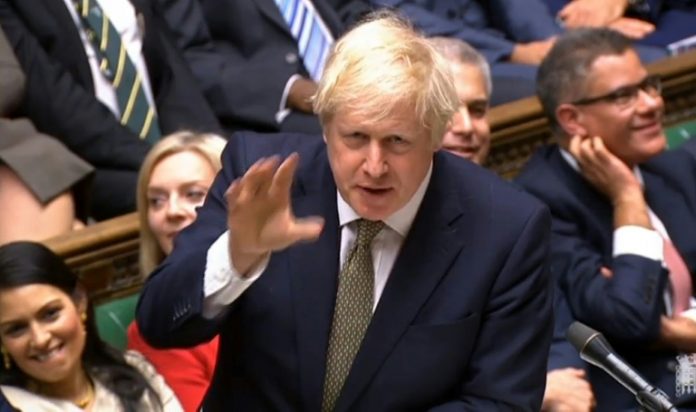Britain’s new parliament on Friday initially approved a revised EU divorce deal that sets up a high-stakes clash with Brussels over their future ties.
The 358 to 234 vote paves the way for Prime Minister Boris Johnson to deliver on his winning general election promise to “get Brexit done” by January 31.
But it also pushes Britain and the remaining 27 European Union member states closer to another cliff edge that could end decades of unfettered trade when the post-Brexit transition period shuts at the end of 2020.
A snap poll last week gave Johnson’s pro-Brexit Conservatives a commanding majority of 365 seats in the 650-member lower House of Commons.
The main opposition Labour party – out of power since 2010 and riven by internal conflicts over Britain’s place in the world – was relegated to its worst defeat since 1935.
Johnson’s triumph dispelled any doubts over whether Britain would follow through on the results of its 2016 referendum and become the first nation to leave the bloc, ending almost half a century of EU membership.
“Now is the time to act together as one reinvigorated nation, one United Kingdom, filled with renewed confidence in our national destiny and determined at last to take advantage of the opportunities that now lie before us,” Johnson told lawmakers ahead of the vote.
“It will be done. It will be over. The sorry story of the last three and a half years will be at an end and we will be able to move forward.”
The government hopes to hold a final vote on Johnson’s separation terms on January 9.
Yet Britain remains a politically divided country in which debates over Europe rage on.
Labour leader Jeremy Corbyn is stepping down in the wake of the election fiasco.
But he told parliament ahead of the vote that Johnson was setting the country on a “reckless direction” that handed power to big business and risked consumers’ health.
“We still believe it’s a terrible deal,” Corbyn said.
“This deal will be used as a battering ram to drive us down the path of yet more deregulation and towards a toxic deal with Donald Trump that will sell out our National Health Service,” he said.
He raised the prospect of rat hairs in paprika and maggots in orange juice in a trade deal with Washington.
The secessionist Scottish National Party’s parliamentary head Ian Blackford also maintained his doom-laden vision of Brexit.
Blackford warned that Britain was now “blindly hurtling towards the cliff-edge” that would “cost thousands of jobs in Scotland”.
“We reject this toxic Brexit legislation and make the case clear that this UK government cannot drag Scotland out of the European Union before gaining the legislative consent of the Scottish parliament,” he said.
The SNP’s independence drive is likely to remain a concern for Johnson’s government in the months to come.
Businesses and investors are also worried about a series of small but potentially consequential changes into the official Withdrawal Agreement Bill.
Britain’s formal departure on January 31 is due to be followed by an 11-month transition period during which things are to stay pretty much as now.
London and Brussels are supposed to use the time to negotiate a comprehensive new agreement covering everything from trade to security and data protection.
EU officials warn that such deals usually take years to hammer out.
But Johnson ruled out the possibility of asking for a deadline extension in the version of the bill before parliament on Friday.
“A Minister of the Crown may not agree… to an extension of the implementation period,” the bill now says.
It puts psychological pressure on European officials to back off some of their stiffer demands on London and seek a limited deal that leaves some big issues unresolved.
Welsh nationalist MP Jonathan Edwards told Johnson he had “boxed himself into a corner” by ruling out an extension.
But the prime minister said the lesson of Brexit talks thus far – the departure date was delayed three times from March 29 – was that a firm deadline “strengthens our negotiating position”.
“Drift and dither mean more acrimony and anguish,” Johnson argued.
The EU’s chief Brexit negotiator Michel Barnier said on Tuesday that the bloc “will do the maximum” to meet the end-of-2020 deadline.
















